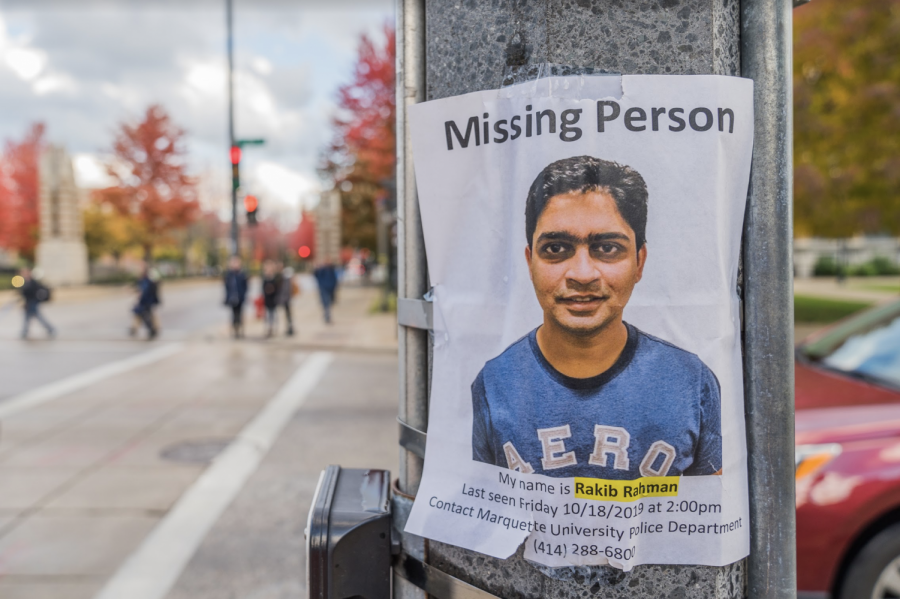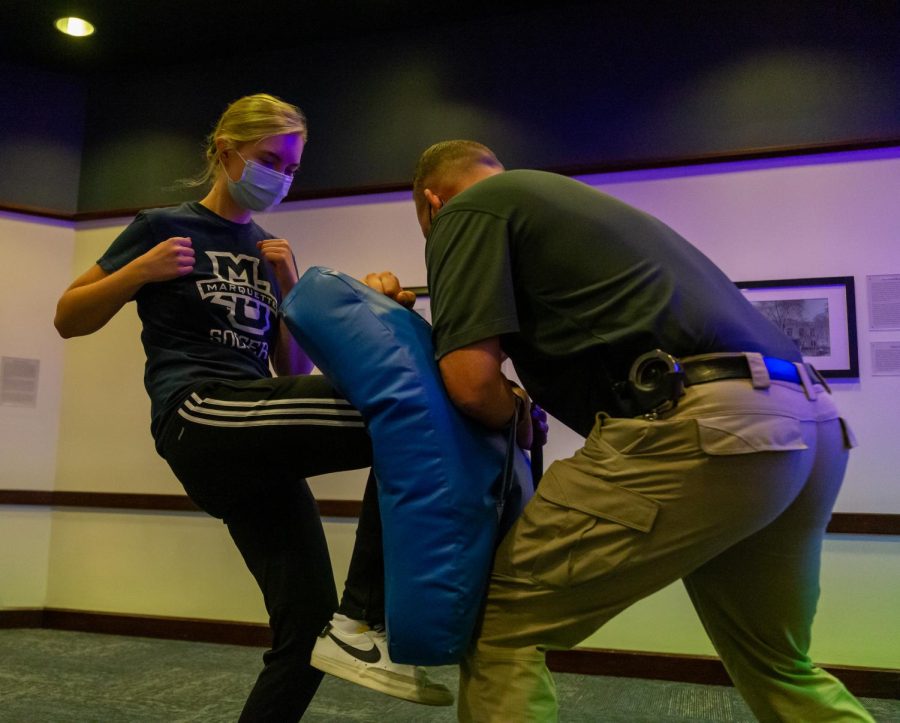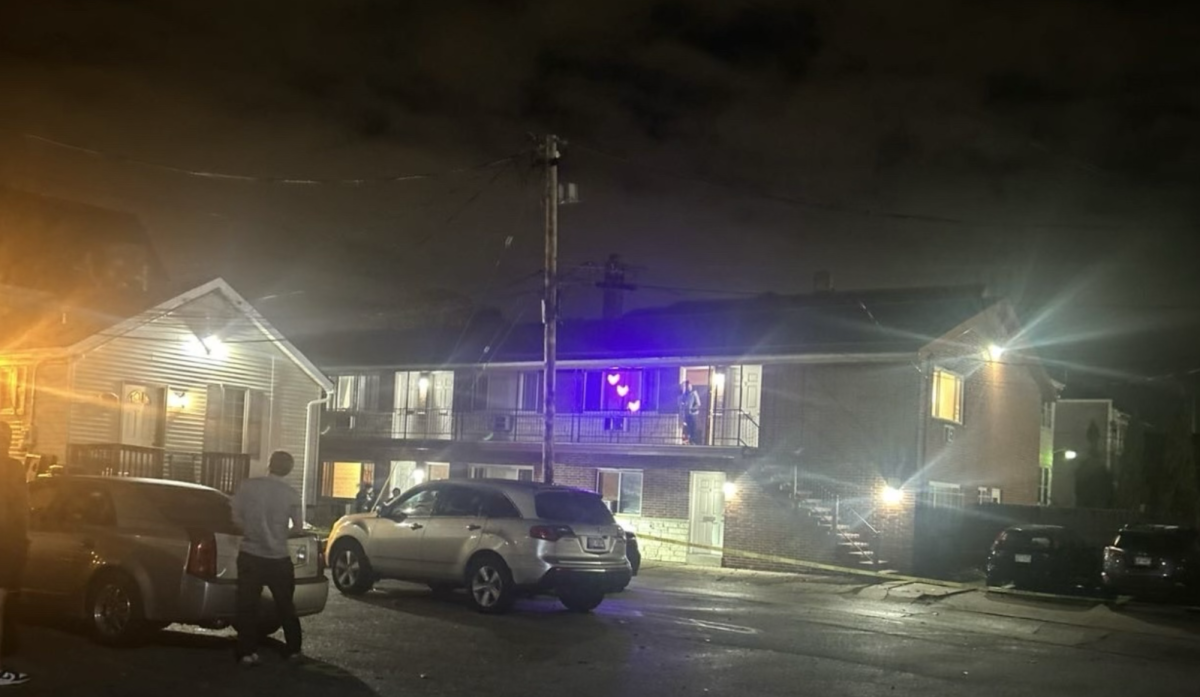Rakib Rahman, a PhD student in electrical and computer engineering, remains missing after being last seen Friday at 2 p.m. near 17th and State streets, close to the area of his residence.
Flyers with photos of the student, who is originally from Bangladesh, are posted around campus, urging community members to contact Marquette University Police Department with any information about his whereabouts.
A group of engineering students posted the flyers Saturday afternoon in an effort to help find their peer.
“It shook everybody to the core,” Mohammad Shakhawat Hossain, a graduate engineering student, said of Rahman’s disappearance.
MUPD assistant chief Jeff Kranz said the department assigned detectives and officers to focus on the case.
“I have resources dedicated solely to this investigation,” Kranz said.
He said officers contact Rahman’s family members multiple times a day with updates. Rahman’s wife, with whom he lives, reported him missing Saturday.
“They lived together, and he hadn’t been around,” Kranz said.
Other graduate students who know Rahman said he left his apartment Friday afternoon after drinking a glass of milk and messaging his wife to see if she wanted to go grocery shopping at Walmart. After leaving his apartment and not returning, Rahman’s wife tried calling him, but he did not answer.
She said she figured he was busy working and slept in Engineering Hall overnight.
The next morning, she went to the building with one of Rahman’s friends and an MUPD officer. They could not find him in classrooms, bathrooms or elsewhere.
The other engineering students, also from Bangladesh, said it is unlike Rahman to leave without saying anything. They said they all saw him the week leading up to his disappearance, exchanging typical greetings.
On Wednesday, graduate engineering student Mohiuddin Munna went with Hossain and Rahman to get coffee at 7-Eleven on campus.
“That day, (Rahman) doesn’t seem unhappy, no sign of that,” Munna said. “He’s just talking normally — very normally.”
The friends said Rahman showed occasional signs of depression, feeling overwhelmed with coursework and a project. But it seemed like a “normal thing” for all students, Munna said.
“We have connections, the Bangladeshi people … If I’m in danger, other Bangladeshi people would help me,” Munna said, adding that there are more than 30 graduate students from the country. “If he has some stress or some difficulty, he can share with us. We will try to help him.”

Graduate engineering students Mohiuddin Munna (left) and Protap Mahanta discuss their efforts to find their missing friend Rakib Rahman.
Rahman withdrew $700 from his bank shortly after his disappearance, graduate engineering student Sakin Satter said. Kranz said he could not confirm this information.
Kranz said Rahman’s disappearance does not appear to involve suspicious activity. He said the student was seen walking alone on surveillance video near his apartment shortly after he was last seen by his wife.
“There’s nothing to indicate criminal activity was involved in the disappearance,” Kranz said.
Kranz said the department does not believe Rahman is in danger. He said MUPD may release information to the campus community once the student is located.
“MUPD is guessing that maybe he went somewhere on his own will. But as far as we know him, it’s very unusual,” Farhana Anwar, a graduate engineering student, said. “He has his wife here, so why would he go somewhere without informing her? Because she depends on him. He has to take care of her.”
Anwar said Rahman’s wife is staying in the United States on a dependent visa to be with her husband, who she relies on for income.
Some of Rahman’s classmates said they have stayed with his wife to provide her with support.
MUPD has not classified Rahman as a critical missing person, a higher standard of missing persons which mandates certain investigation procedures by law enforcement. Police departments publicize photos and information about a critical missing person to local media outlets for attention.
To be classified as a critical missing person in Milwaukee, someone must be a military veteran, victim of foul play, under 11 years old or under 18 years old with a minor child in their custody. Other criteria include the person having a disability or medical condition that could harm them.
According to current investigation findings, Rahman does not meet the standard.
Protap Mahanta, an engineering graduate student, said the department must consider the cultural context surrounding Rahman’s disappearance.
“In our culture, even if you’re an adult, it’s very unusual to just walk away from home without notifying anyone,” Mahanta said. “According to this country’s laws, they’re thinking this is not critical missing, but in our culture, this is really very, very critical.”
For now, Rahman’s friends will continue to worry about him, the “quiet” and “rational” student who they said days earlier was planning fall break activities and preparing for his PhD qualifying exam this January. He missed his first class after break, Advanced Engineering Mathematics, at 4 p.m. Monday in Engineering Hall.
“We are just waiting for him,” Mahanta said.
The students already patrolled the area for Rahman, who they hoped might be somewhere nearby.
“At first, I thought that something bad happened. … I thought that maybe some robbery or some kind of kidnapping … I’m thinking that somebody beat him or maybe he’s somewhere,” Munna said.
This is not MUPD’s first report of a missing student. However, those cases tend to resolve relatively quickly, Kranz said.
Kranz encouraged community members to contact MUPD at 414-288-6800 with any information about the case.
“Sometimes, what you may think is a non-relevant piece of information can be very important,” Kranz said.
As of Monday evening, the university did not release any notice about the student’s missing status to the campus community.
“As a university community, we offer hope for the family and we pray that the individual is found healthy and safe,” university spokesperson Chris Stolarski said in a statement.












